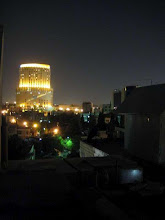(Cl)
Ever since we've been back from Israel, our schedule has gained some momentum. A dinner here, a meeting there, a trip to thus and such place... Coupled with the fact that its been difficult to process our experience, has resulted in the delay of this blog. But in that time, we've had the opportunity to talk through the issues concerning this area of the world with one of the workers. I honestly had no clue what the real problems over here were, outside of an evangelical christian worldview. Or to be fair, an ignorant view, that was assembled from assumption and second-hand information.
To my knowledge, information that is processed subjectively; with a theory or philosophy waiting to analyze it, does not always yield a true picture. Speaking from hermeneutic grounds, that sort of a thing is considered isogesis. I get the impression that Israel and Palestine and the conflicts between them have been written by the majority (at least in America), because some predominant leaders' eschatology or maybe just tradition, assumes that the problems "over there" will be sorted out by God. If any of that is even true, I wouldn't be surprised that we feel this way. Problems always look insignificantly smaller when off in the distance.
But I'm close. Close enough to the hear voices. Close enough see the expressions on the faces of the people, and get a feeling of the despair that many Palestinians feel. Jerusalem was the closest I've been, and it changed things. I've seen a Christian, a Muslim, and a Jew walking down the same narrow street together, yet I cannot imagine that is what people think of when they sport a "coexist" tee-shirt or bumper sticker on their car. If it is, they need to re-evaluate what coexisting really means. Is tolerance the answer in and of itself, or is it a step among many steps in the right direction? My group and I just happened to be in Israel when two events occurred that made the news. The first was a fight between two priests in the Church of the Holy Sepulcher. Chris and I were perusing some shops just outside the gate, when Israeli police from everywhere rushed past us to secure the church grounds. The second took place on our return trip. We were passing through a neighborhood when we found ourselves stuck in traffic (of all places), creeping past Israeli police gaurding the house from its former Palestinian residents who had been evicted that morning. The family was evicted on the grounds that their house legally belonged to Jews, some fifty years ago.
Jerusalem is beautiful. The most beautiful city I've ever seen (keep in mind I've never been to Europe). The culture is rich, and the sights are breath-taking. We watched the Jews dance as they welcomed the sabbath, heard muslims call for prayer in the Old City, joined priests procession to the traditional site of the cross, and sat down in front of the Dome of the Rock, imagining what the temple would have been like with my bible open to its specfications (The Dome sits on the Temple Mount, where the old temple used to be). If I were a true tourist, I would have left feeling intrigued about ancient things existing in the modern, and that would have been that. And while I did feel that, when I returned to Amman the real problems that only were hinted to me in Jerusalem began asking hard questions. The religious wonder of it all seemed to lose face in sight of the injustices happening in the here and now. I have no answers, only scattered thoughts that wrestle with centuries upon centuries worth of history. Israel is on the front end of oppression against the Palestinian people, just watch the film Paradise Now or The Iron Wall. But the struggle has been ongoing, and neither are blameless. The only thought that stands out in my mind comes in the form of a question. Who will be the first to act like the world DOESN'T owe them something, and look past the offense to find peace? Essentially, who will be the first to love?
Jesus said, "I did not come to bring peace, but a sword." (Mat. 10:34). It is good to ponder such things.
Subscribe to:
Post Comments (Atom)

No comments:
Post a Comment